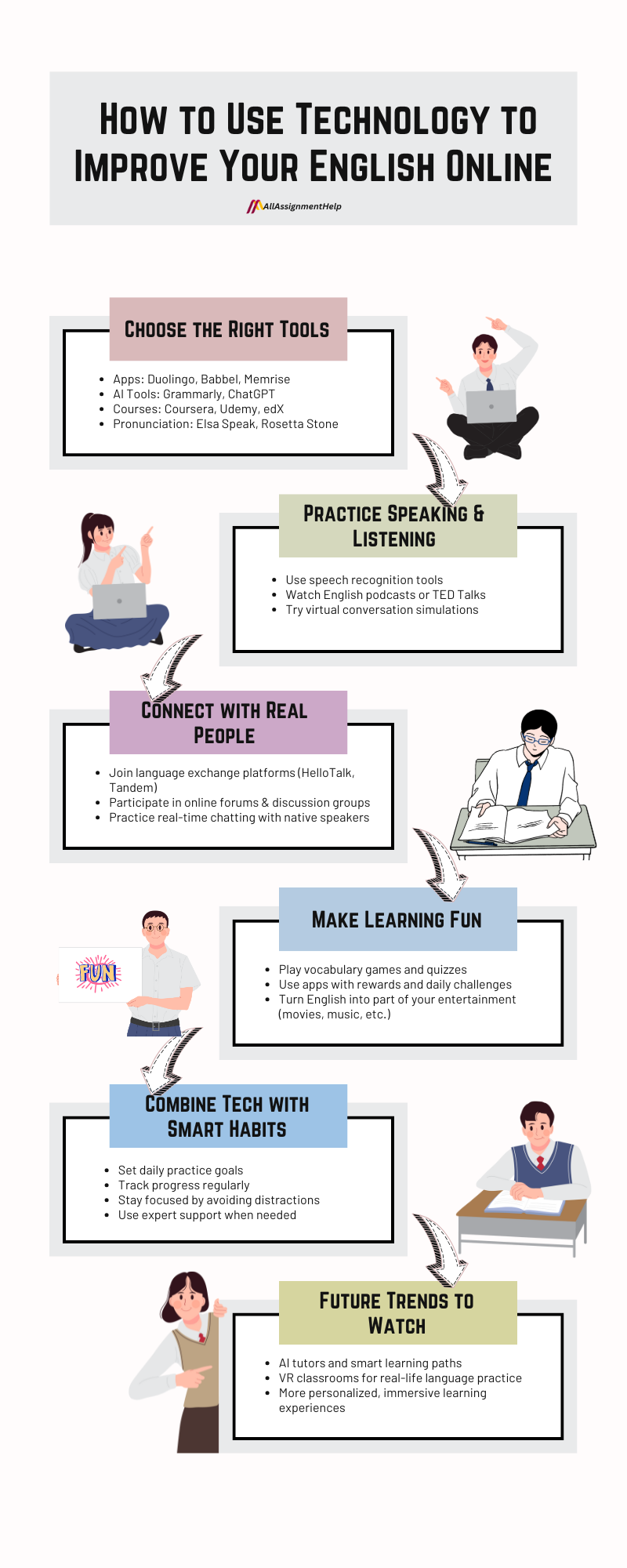Table of Contents
There is no need for you to stop studying English just because you are not interested in doing dull grammar exercises or memorising a list of words. Due to technology, your laptop or telephone can provide you with mini-lessons of the English language when you are having a coffee at home or heading out. Technology has changed the way we learn another language, with AI online professors who are correcting your speech while you talk to them and apps that are making learning a game. The finest aspect? You can choose what suits you. We will examine some of the ways that technology might improve your online English language understanding in this post from All Assignment Help.
The Evolution of Technology in English Language Learning
The days of dry textbooks and strict language-learning classes are over! However, students relied heavily on grammar books, limited audio content, and classroom presence. Despite their effectiveness at the time, these are sluggish, rigid, and only available locally.
With the invention of the internet, materials online have multiplied, where students are now able to access lessons, exercises, and native speakers immediately and across the globe. With the advent of new technology, learning English has been revolutionised with interactive apps and virtual tutors that make it easy and personalised to learn.
Even online assignment help platforms, created to provide academic support, contributed to the learning experience of various languages. Such platforms tend to offer well-written essays, reports, and research papers that allow learners to gain insight into good-quality English language writing. Through these examples, students can enhance their grammar, vocabulary, and all writing skills necessary for academic writing.
Learners previously leveraged technology, including AI chatbots to develop oral skills, podcasts for listening, and sophisticated editing tools for writing. Because it constantly evolves, technology is still one of our best friends that helps everyone to continue enjoying, learning, and communicating in the English language at a more convenient pace.
Also read: English Techniques to Learn and Analyse Written Text Better
Key Technologies to Enhance English Language Understanding
Technology progresses at a fast pace and provides various tools for enhancing learning English. They provide an interesting, individualised, and hassle-free approach to learn the reading, writing, speaking, and listening skills.
Language learning apps
Now apply this to apps you may have heard of, such as Duolingo, Babbel or Memrise, that have revolutionised the way we learn English. With its gamified approach, their method is entertaining, offering bite-sized drills teaching vocabulary, grammar, and pronunciation. These apps allow learners to learn at their own pace, track their progress and even have a little friendly competition with others.
AI-powered tools
With the advent of Artificial Intelligence, language learning is alive and kicking like never before. Real-time feedback on grammar and sentence structure could be provided through ChatGPT or Grammarly. They can practice conversation in simulated chats, get clarification on the spot, and learn what suggestions to use in writing. Online class help platforms utilise AI and expert guidance to offer coursework assistance to busy students. Thus allowing them to continue experiencing content while still developing their language understanding.
Online courses and MOOCs
There are hundreds of English language online courses of varying levels of knowledge according to educational sites like Coursera, Udemy, and edX. Typically, these courses have a mix of lectures, assessments, exercises, and discussions with your peers. There are even services where students can send their queries, like, Please take my online English class for me. These are great for those students who do not feel like they can manage their time properly. It takes away the stress of deadline management while still managing to complete their English course in good academic standing and with indirect exposure to the course content.
Speech recognition and pronunciation tools
Clarity and fluency are the key here. Using face recognition technology and advanced algorithms, speech recognition tools like Google Speech-to-Text, Elsa Speak, and Rosetta Stone create a solution for speaking practice by allowing learners to practice speaking accurately. These tools provide instant feedback on pronunciation, intonation, and fluency levels. It makes learners sound more natural and confident to speaking in real dialogues.
Interactive media and podcasts
Listen to English movies and English podcasts. Platforms such as TED Talks are very useful for practising listening and vocabulary. With interactive subtitles, transcripts, and discussion boards, these platforms enable learners to engage with authentic and entertaining content. They allow students to build an enriched learning ecosystem around their objectives and timelines.

Interactive and Immersive Learning Experiences
Language becomes ingrained in life gradually because of study methods that are less focused on memorisation and more experience-based and participatory. These experiences are now accessible to students worldwide because of technology!
Virtual Reality (VR) and Augmented Reality (AR)
Both VR and AR incorporate real-world language situations in a virtual world. As an example, geek out your VR apps that may imitate day-to-day activities such as ordering meals, shopping, or attending a conference, wherein learners can talk and listen and polish their ability. Users can practice in real-world situations and feel more confident because it enables them to learn in context.
Online communities and language exchange platforms
There are a few platforms like Hello Talk, Tandem, and Speaky that connect you with English language learners and native speakers and pursue live conversations. Textbooks sometimes miss a vital cultural factor that you get with these exchanges. Not only does it allow you to practice more casual dialogue, but you also get to learn slang and cultural nuances while befriending people from all over the world.
Gamification and interactive games
Fun has been incorporated into classes, where students can learn vocabulary, grammar, and comprehension skills through educational games, quizzes, and challenges. Students who get stressed out with exams prefer interactive games that relieve anxiety and help them achieve better scores. However, few students contact platforms with thoughts like, who would do my online exam, to solve this life-threatening test problem? However, through the gamified learning process, you can practice consistently, and it will help you develop confidence in the examinations.
Webinars, live classes, and interactive workshops
These classes and workshops are real-time, meaning you will interact with the instructor and other participants in the moment. This enables students to inquire, communicate, and obtain instant responses, which encourages them to share what they understand and feel recognised. Those sessions simulate a lot of the benefits of actual classrooms but are not geographically bound.
Merging immersive technologies with interactive platforms can provide learners with the opportunity to learn the English language in engaging, real-world environments that are both effective and fun to use.
Also read: English Essay: Everything a Novice Needs to Know
Overcoming Common Challenges with Technology
Although technology is a great help to learning English, especially with a lot of excellent tools to make the English learning process easier, it also has its disadvantages.
One common difficulty is digital distraction. It can be hard to stay focused on learning tasks with social media, notifications, and endless online entertainment all vying for attention. Learners need to establish firm boundaries, create distraction-free studying environments and put apps to use which promote focus and productivity.
Another difficulty is the vast array of resources available. There are numerous apps, courses, and platforms, and students find it difficult to select reliable and effective tools. When it comes to online platforms, do research and read reviews before proceeding, and start with established platforms that complement your learning goals.
Moreover, many do not have ready access to reliable internet or high-quality devices, further restricting their ability to join live classes or use interactive tools. These limitations can be overcome by searching for offline resources or downloading lessons for use later.
In addition to their tech-based learning, sometimes learners also need supplementary academic assistance. This is especially true where the services of English homework help prove beneficial. These platforms help with assignments, essays, and difficult tasks, offering expert support that supplements your day-to-day learning.
With the support of proven technology, expert English learning guidance, and the discipline to study regularly, learners can overcome these challenges.
Tips to Maximise Online English Learning
If there is a smart way to use this technology for English language learning, we can use the benefits very well. A goal could range from improving conversational fluency, having a range in vocabulary, or becoming a grammar expert. But the best place to start is to set a positive, realistic, and specific goal in mind. Select tools for all skills like listening apps, writing tools, speaking apps and such.
- Consistency is key. Find some time every day for practice, even if for 20–30 minutes only.
- Integrate the English language into your everyday life.
- Watch English shows, listen to podcasts, or read articles on stuff you like!
- The engagement has helpful learning experiences. No need to be afraid of making mistakes.
- Finally, track your progress, tweak your studying method where necessary, and ensure that you are still enjoying yourself during this process.
The Future of Technology in English Language Learning
The future of English language learning is only going to be more personalised and immersive. AI kept churning out very dynamic learning paths, lessons that are customised to fit strengths and weaknesses. Virtual reality and augmented reality will provide more real-world application practice contexts, allowing learning to resemble natural dialogue. Speech recognition-based tools that provide instant feedback will enhance the accuracy and help the learners in mastering their pronunciation more easily. Global connectivity will also open doors for students to share language learning experiences with native speakers of various cultural backgrounds.
Conclusion
The English learning has changed a lot thanks to technology, and it is more flexible, interactive and accessible nowadays than ever. From a writing assistant powered by AI, to a new app for learning a language, to a virtual reality experience and all the other experiences we may not have thought about, learners have access to more opportunities to practice than ever before. We can improve our English only step by step with the right mix of online resources and consistent practice. The trick is to make use of these innovations without losing patience and never stopping with the drive.
Frequently Asked Questions
Question: How can technology guide me in learning English?
Answer: Interactive apps, AI tools, and virtual classes allow for flexible and fun learning through technology.
Question: Do foreign language apps help to improve your English?
Answer: Yes, Duolingo and Babbel are examples of gamified structured lessons that will help you advance slowly but surely.
Question: Can I practice speaking English with online tools?
Answer: For sure, several platforms use tools to recognise speech and AI to master pronunciation and fluency.
Question: How do you feel motivated when learning English online?
Answer: Establish specific targets, monitor progress, and explore different captivating tools to sustain interest.
